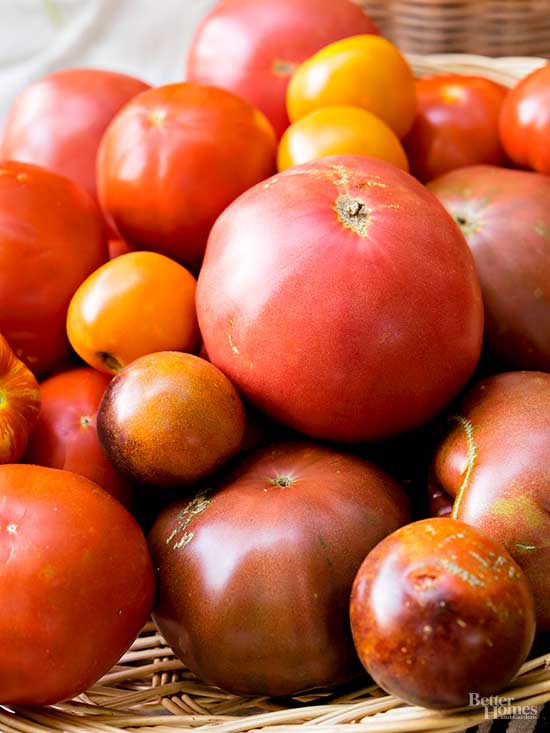






What is an heirloom seed?
Simply put, heirloom seeds have been around for years. Like heirloom china, heirloom seeds have been handed down from generation to generation. Seeds are generally considered heirlooms if they were cultivated more than 50 years ago; however, some plant experts consider only seeds cultivated prior to World War II to be heirlooms--which, of course, makes them much older. Suffice it to say that heirloom seeds, as their name suggests, are old.
So why plant heirlooms?
Some of the best-tasting vegetables and most beautiful blooms come from heirloom seeds. If you want a connection to the past, by perhaps eating the same tomatoes your great-grandmother grew, you can do that with heirlooms.
Other reasons for planting heirlooms are their time-tested quality and their regional adaptability. For example, 'Arkansas Traveler' is a tomato that is resistant to cracking and disease and which also excels in the South's high heat and humidity. Here are a few more characteristics of heirloom seeds--and reasons you should include them in your garden.
Heirloom seeds have interesting pasts.
Because heirlooms have been around, some for centuries, many have histories associated with them. For example, the black Hollyhock can be traced back to Thomas Jefferson's garden at Monticello (and in texts as early as 1629), yet you can still grow the exact same plant today in your garden.
Heirlooms have been focus-grouped--by time.
Here's an impressive focus group: gardeners who have passed down the same heirloom varieties for centuries. These seeds wouldn't be in production today if they hadn't had that special something that made our ancestors want to plant them, collect their seeds, and plant them again, year after year, decade after decade. Heirloom seeds have passed the ultimate quality tests because they were delicious, beautiful, successful, and loved.
Heirloom seeds are open-pollinated (but not all open-pollinated seeds are heirlooms).
All plants, in order to reproduce naturally, need to be pollinated. Open pollination means that heirloom seeds are pollinated the way Mother Nature intended--with pollen that arrives on the legs of a bee, butterfly, or other insect or bird, or has been whipped along on a summer breeze. Heirloom seed is open-pollinated, but so are other seeds; the length of time the seed has been in existence is what makes it an heirloom.
Heirloom seeds breed true.
If you harvest the seeds from an heirloom plant in the fall and plant them the next spring, the plants will grow up and look just like the parent plant (as long as the plant was pollinated by pollen from the same plants). But over time, open pollination might cause heirloom seeds to become hybridized and begin to take on new characteristics. So to get true heirloom seeds, you need to buy them from an heirloom seed producer.
What's the difference between an heirloom and a hybrid?
Plant hybridization has been happening in nature forever. Hybrid plants are created by growing and crossing unrelated parents of the same type (such as two hibiscus) to create a new variety. But systematic plant hybridization has been happening since the 19th century. Scientists, such as Mendel and Darwin, found that selective breeding created plants with superior characteristics--called hybrid vigor. For example, tomatoes that have been hybridized or crossbred for resistance to disease in just one generation are called F1 hybrids (seeds will indicate hybrid status in their name by being called a hybrid or F1, such as 'Elan' F1 Strawberry). So heirloom seeds can be used to create hybrids, but heirloom seeds themselves are not true hybrids.
Can heirlooms be GMO?
In a word: no. GMO stands for Genetically Modified Organism; these seeds have had their genetics, their DNA, changed in a laboratory through biotechnology. For example, GMO soybeans are made genetically resistant to some pests, diseases, and herbicides. So, by definition, heirloom seeds can't be GMO. Additionally, you don't need to worry about buying GMO seeds if you want to avoid them, because there are no GMO seeds available to home gardeners; GMO seeds are only used in big agriculture.
Heirlooms seeds might be organic--or not.
The concept of "organic" refers only to how seeds are grown and produced. Organic seeds must be raised in accordance with organic standards set by the USDA's National Organic Program and grown in certified organic soil using only fertilizer and pest controls that are allowed by organic regulation. If you want to buy organic heirloom seeds, look for the USDA Organic symbol.
Where can you buy heirloom seeds?
Seed saving organizations and seed companies that produce heirlooms are both good sources for purchasing heirloom seeds.
Get our ultimate guide to starting seeds.
Why You Should Install UPVC Windows and Doors
How to Plant and Care for Flower Bulbs
Should You Use Organic Seeds and Plants in Your Organic Garden?
What Should You Build Backyard Ponds and Waterfalls
Getting To Know What Flowers Are Seasonal And What Are Not
Copyright © www.100flowers.win Botanic Garden All Rights Reserved